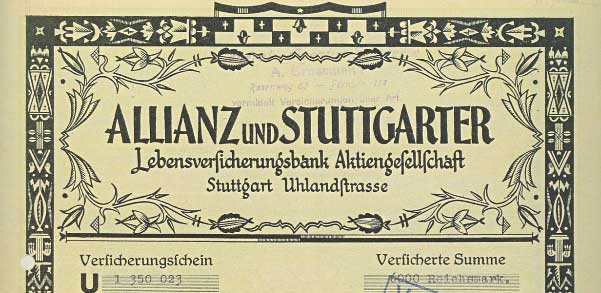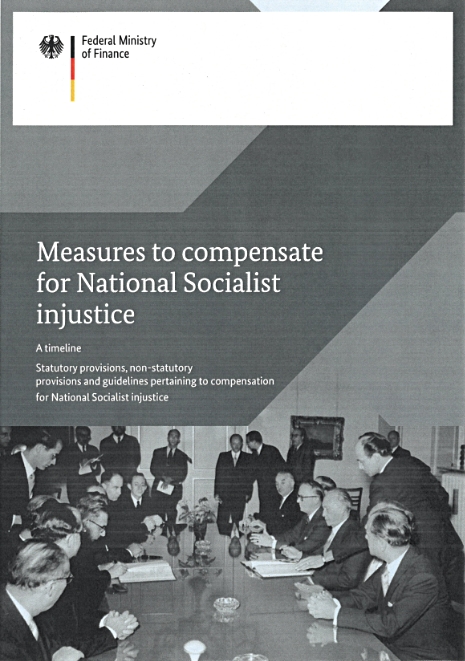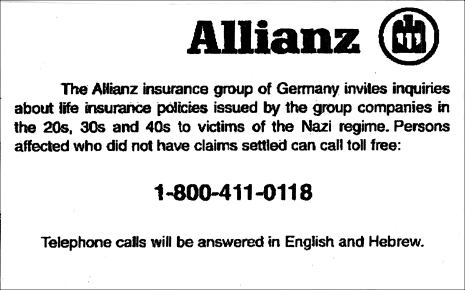Post-War Compensation for Expropriated Life Insurance Policies
Compensation for expropriated life insurance policies was handled according to the principles set down in the German Federal Acts on the Compensation of the Victims of Persecution by the National Socialist Regime of 1949 and 1953. The state's restitution payments were intended to help place the injured parties on an equal financial footing with non-persecuted persons. The costs of such compensation are borne by the state because the German Federal Government considered itself the legal successor of Nazi Germany; payments are made by the state restitution offices.
These claims involved not only policies directly confiscated by the state, but also those canceled prior to term owing to persecution.
The insurance companies assisted in the compensation process in two ways: by helping claimants to find documents on their policies, and by calculating individual compensation figures on behalf of the state.
In accordance with the Luxembourg Agreement of 1952, the Federal Republic of Germany paid several hundred million marks to the Conference on Jewish Material Claims against Germany. This and the additional payments made to Jewish successor organizations were used to settle unreported and heirless claims.
Documentation on Measures to compensate for Nazi Injustice published by the German Ministry of Finance.
Allianz's Commitment to Expropriation Victims
In the spring of 1997, a lawsuit was filed against several European insurers in New York. The companies were accused of failing to pay out life insurance policies of Jewish customers dating from before the end of Nazi rule. Allianz attempted to clarify these accusations and to do justice to its historical responsibility.
In April 1997, Allianz set up a "Helpline for Holocaust Inquiries" in order to provide fast and unbureaucratic information. Only a very small number of Allianz Leben policies were discovered that had evidently not been paid out. In each of these cases, the company made an offer of payment. Allianz Leben also commissioned a financial auditing firm to carry out an independent study of its archives.
Since 1998, Allianz has been an active founding member of the International Commission for Holocaust Era Insurance Claims (ICHEIC). The company has also been involved in the “Foundation Initiative of the German Industry” since 1999.
As early as February 1997, Allianz commissioned the economic historian Gerald D. Feldman of the University of California at Berkeley to research the company's history during the Nazi period. His findings appeared in a study published in German and English in 2001.
Notice in the New York Times (1997)
ICHEIC and the Foundation Initiative of the German Industry
The International Commission on Holocaust-era Insurance Claims (ICHEIC), founded in August 1998, was committed to settling the issue of outstanding life insurance policies during the Nazi era. The Commission was set up after long-term discussions involving the United States Insurance Commissioners, major Jewish organizations, the State of Israel and several European insurers. A number of governments and the United States Department of State did also take part as official observers in ICHEIC's meetings. The Commission's work focused on creating a sustainable, international process for the resolution of outstanding life insurance claims. Allianz was a member of ICHEIC since 1998. In March 2007 the successful completion of ICHEIC's claims and appeals processes was announced.
The German industry accepted historical and moral responsibility for the involvement of German companies in the then state controlled economy that existed during the Nazi regime. Organised in the Foundation Initiative of the German Industry, German firms committed themselves to collect 5 billion German Mark (DM) as their contribution to the Foundation "Remembrance, Responsibility and Future".
The Foundation was created with the signature of an Executive Agreement between the Governments of Germany and the United States of America in July 2000. The German Government also contributed 5 billion DM (approx. 2.5 billion Euro) to the foundation.
The treaty is to be the exclusive remedy and forum for the resolution of all claims that have been asserted against German companies arising from the National Socialist era and World War II. The foundation started to distribute its funds in June 2001.
Stuart Eizenstat, German Chancellor Gerhard Schröder and Otto Count Lambsdorff after concluding the negotiations on compensation (2000) - Bundesbildstelle, Berlin




---bundesbildstelle,-berlin.jpeg)
